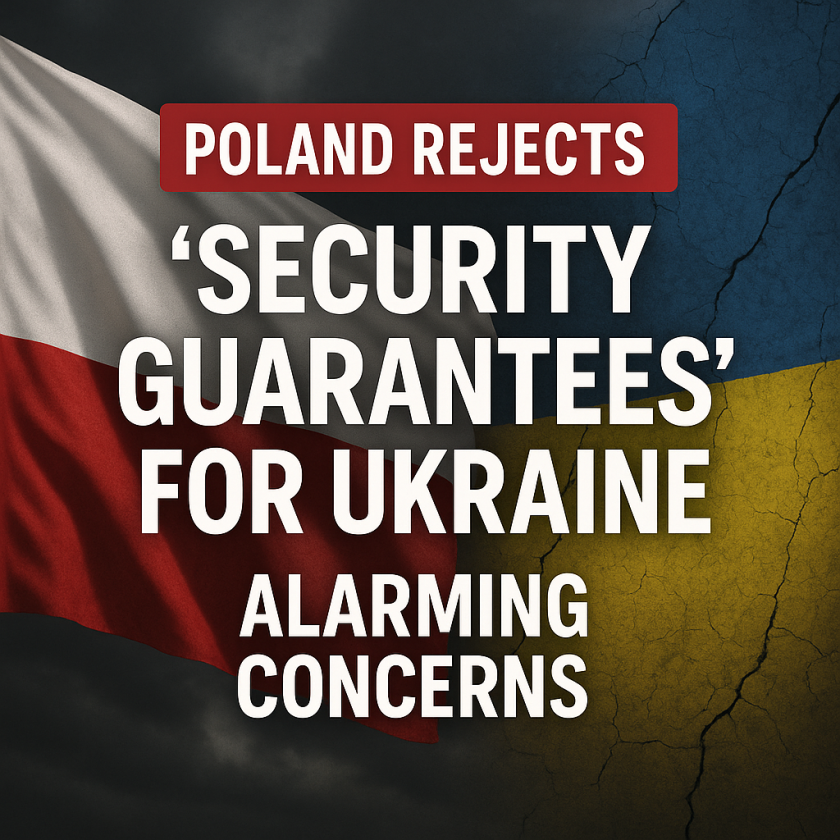Poland Rejects ‘Security Guarantees’ for Ukraine: Alarming Concerns
Poland Rejects ‘Security Guarantees’ for Ukraine: Alarming Concerns
Poland’s recent decision to reject the proposed security guarantees for Ukraine has raised serious concerns across Eastern Europe and the international community. This move reflects not only Poland’s strategic calculus but also the complexities involved in regional security dynamics.
The Context of the Rejection

Poland’s stance comes in the wake of ongoing tensions between Ukraine and Russia, particularly following the invasion in February 2022. Security guarantees are generally expected to provide assurance against aggression, but Poland, a NATO member and a crucial ally for Ukraine, has articulated skepticism toward the proposed arrangements.
Officials from Poland cited a lack of clarity and commitment in the proposed agreements as key reasons for their rejection. According to an article from RT News, Polish officials believe the guarantees do not adequately ensure Ukraine’s security in the long term or account for potential future Russian aggression. This hesitation raises important questions about NATO’s role and the effectiveness of international security architecture in the region.
Diverse Perspectives
The rejection has sparked varied opinions in the media and among policymakers. Al Jazeera highlights a contrasting viewpoint from some European leaders who argue that security guarantees are essential in mitigating the risk of further aggression from Russia. They emphasize the moral obligation to support Ukraine amidst its struggles. This perspective stresses that failing to provide robust support could embolden Russia and destabilize Eastern Europe further.
Conversely, Sky News reports that Poland’s reluctance to sign on reflects a cautious approach driven by domestic concerns and historical experiences with Russia. Citizens in Poland still remember the traumatic episodes of World War II and subsequent Soviet control. For many, trusting security guarantees, especially in a volatile environment, feels precarious.
The Complications of Commitment
One significant challenge in establishing security guarantees for Ukraine lies in the diverse nature of commitments from different countries. Each nation’s strategic interests may influence their willingness to extend military support or financial aid. Furthermore, historical precedents of mixed responses to crises complicate the perception of reliability. Security guarantees could be perceived as empty promises, lacking the necessary resolve to act if circumstances escalate.
Recent commentary has also illustrated the uncertainties surrounding Western unity over Ukraine. The potential for divisions among NATO allies concerning their commitment to Ukraine’s security raises alarms about the future of regional stability. Poland’s decision brings forward a larger conversation regarding the effectiveness of a collective response in the face of aggression and the potential risks of a fragmented stance.
Implications for the Region and Beyond
The implications of Poland’s decision extend far beyond its borders. The geopolitical landscape in Eastern Europe is already fraught with tension, and the refusal to solidify security commitments could embolden adversarial states. Some analysts warn this could pave the way for increased assertiveness from Russia, which may feel less threatened without a unified front from NATO.
Moreover, Poland’s rejection influences other countries’ perceptions and strategies regarding their relationship with Ukraine. For instance, neighboring Baltic states, who are also concerned about Russian expansionism, may feel compelled to reassess their security strategies in light of Poland’s cautious approach. The overall collective defense dynamics within NATO are also at stake, as countries reassess their roles and obligations in a rapidly changing security environment.
Conclusion: A Path Forward
In conclusion, Poland’s rejection of security guarantees for Ukraine illustrates the intricate layers of regional diplomacy, security concerns, and historical memory that complicate the landscape. While some view it as a prudent safeguard against hasty commitments, others see potential dangers in not providing unequivocal support for Ukraine.
The situation remains fluid, and as the conflict evolves, so too will the discussions surrounding security in Eastern Europe. Maintaining open lines of communication among NATO allies and fostering a genuine commitment to collective security will be crucial. Ultimately, the challenge lies in balancing fears of aggression with the need for strategic cooperation to ensure the stability of a region still haunted by its past.






































